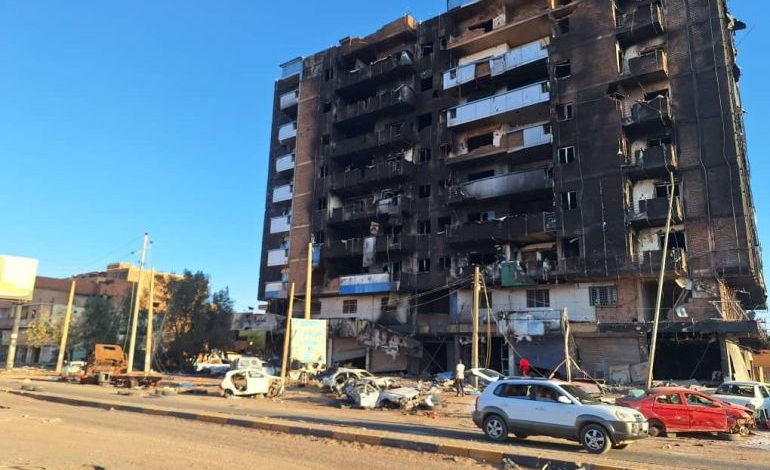When Will Khartoum Residents Return Home?

Sudan Events – Agencies
“How can I return, and where do I even start? I lost everything. They demolished my house and leveled it to the ground after looting all its contents. There’s nothing left to encourage me to go back.” With these words, and through tears he could not hold back, Abdullah Al-Sayed answered Al Jazeera Net’s question: “When will you return to Khartoum?”
The man in his fifties spent nearly half his life working in the Gulf states, managing to build a two-story house and own a small transport vehicle. Overnight, he lost everything. Shells struck his house, and looters stole everything inside, including his vehicle, forcing him to seek refuge in Egypt.
This emotional turmoil is shared by tens of thousands of Sudanese citizens since the announcement of Khartoum’s liberation from Rapid Support Forces (RSF) control. Many are torn between the desire to return and the uncertainty of what awaits them.
People are questioning whether returning is feasible given the large-scale destruction caused by the war, the collapse of essential services, the loss of property, and the continued lack of security stability.
A Difficult Return
Mohamed Ibrahim, a resident of the Khartoum (2) neighborhood, faces a situation similar to Abdullah’s. He, too, cannot return at present because his children are studying in schools in Atbara, a city in River Nile State, northern Sudan.
He told Al Jazeera Net that he does not even know the condition of his neighborhood or his house, making his return uncertain.
Zainab Ahmed Mohamed Saleh, an employee at a private company importing car tires, also finds returning impossible at this stage. Speaking from Halfa in Northern State, she describes the situation as bleak, adding that the security conditions in her area are unstable, based on her knowledge.
She told Al Jazeera Net that returning to the capital is unrealistic at the moment, given the extensive destruction of hospitals and health centers. Some of her family members require medical treatment and medication for chronic illnesses, which complicates any plans to return.
Meanwhile, Mohamed Saeed occasionally visits his home in the Danagla neighborhood of Khartoum Bahri to check on it. He noted that the area lacks essential services.
According to his statement to Al Jazeera Net, he expects to return with his family—currently displaced in Omdurman—after a long journey through three different states, despite the absence of electricity and water and the poor conditions in his neighborhood.
Hani Nassar, a businessman running a packaging company and residing in the Khatmiyya neighborhood of Khartoum Bahri, believes the devastation left by the war has made returning extremely difficult.
He feels that staying in Atbara, River Nile State, is a much better option for his family due to the availability of some basic services.
Starting from Scratch
Conversely, Al-Sir Al-Rayeh’s family is preparing to return to the Kalakla suburb south of Khartoum after Eid al-Fitr. The family’s patriarch told Al Jazeera Net that although life in the area will be challenging due to the lack of water and electricity and the presence of looting gangs who emptied his home of furniture, he has no other choice. His savings are running out, and he can no longer afford to pay rent amid the high cost of living in Egypt. Thus, he must return and start over from scratch.
According to the latest data from the International Organization for Migration’s Displacement Tracking Matrix, Sudan currently has approximately 11,301,340 internally displaced persons, including those displaced both before and after the outbreak of the conflict.
Among these displaced individuals, 31% fled from Khartoum, with an estimated 3.5 million people displaced from the capital.
On March 27, the International Organization for Migration reported a 2.4% decrease in the number of internally displaced persons in Sudan over the past three months, marking the first decline since the crisis began nearly two years ago.
This decline is primarily due to displaced persons returning to their original areas. However, the organization warned that these individuals are returning to areas that have suffered extensive damage, with little access to shelter, food, infrastructure, education, and basic services.
Since December 2024, a total of 396,738 people have returned to their homes in the states of Al-Jazirah, Sennar, and Khartoum.
According to the migration organization, these movements reflect a cautious yet hopeful development, as returnees strive to reclaim their homes and resume their lives after months of intense conflict.
Damage and Measures
Sudanese police spokesperson Brigadier General Fath Al-Rahman Mohamed Al-Tom told Al Jazeera Net that “the rebel militia” has targeted police buildings, facilities, and stations since the start of the war. Many police residences, hospitals, and citizen service centers, including public service complexes and criminal investigation departments, have been destroyed.
He added, “The damage is extensive, and reconstruction will require extraordinary efforts. However, the police are determined to rehabilitate all affected facilities.”
He also stated that the police have deployed forces to secure all recaptured areas, resumed work at criminal investigation departments to process citizens’ reports, and set up patrols and security checkpoints to ensure residents can return to their homes safely.
Meanwhile, Khartoum State’s Security Committee announced a series of measures to manage the next phase. A government official told Al Jazeera Net that directives have been issued to complete the deployment of security forces to curb crime and protect strategic facilities in all liberated areas.
He also mentioned ongoing government efforts to restore electricity and water services, despite severe damage to power stations caused by RSF shelling.
Additionally, the Department of Forensic Medicine at the Ministry of Health in Khartoum State—working alongside the Civil Defense Forces and the Sudanese Red Crescent Society—carried out operations in mid-March to collect bodies, sanitize streets, clean public facilities and homes, and remove war debris. These efforts aim to ensure a safe return for citizens to their homes.
(Source: Al Jazeera Net)



